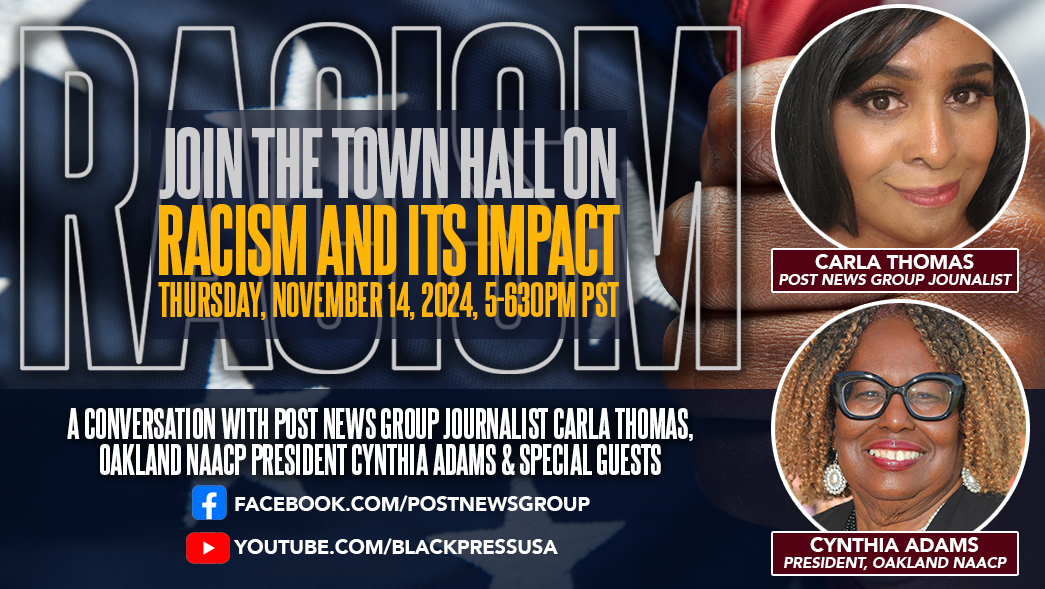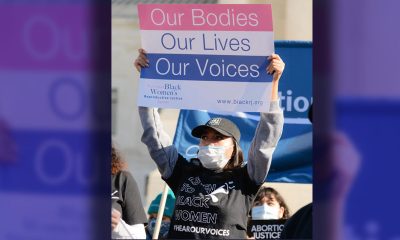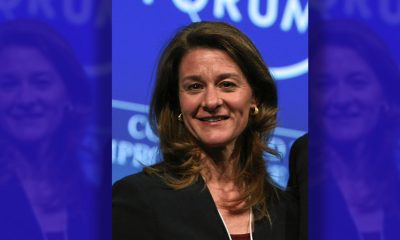Health
Abortion Rights Issue Regains Momentum
By Jazelle Hunt
NNPA Washington Correspondent
WASHINGTON (NNPA) – When she was five months pregnant, past the point where she could obtain a legal abortion, 23-year-old Kenlissia Jones of Albany, Ga. ordered prescription abortion pills from a Canadian website. When Jones started feeling pain, she was rushed to the hospital.
En route, she delivered the fetus in the backseat of her neighbor’s car. The fetus died 30 minutes later. Instead of being comforted in her hour of loss, Jones was arrested at the hospital and charged with murder.
With agonizing stories such as Jones’ in the news, reproductive rights issues are again coming to the forefront of public attention and are certain to be an issue in the upcoming presidential election.
That battle is already being played out at the state level. Since 2010, legislators in 31 states have passed almost 300 abortion-related laws, more than 50 of them in this year alone.
According to the Kaiser Family Foundation, White women accounted for 55 percent of all legal abortions in 2011. Black women accounted for 37 percent. Still, reproductive policies disproportionately affect African Americans. They report more unintended pregnancies, have a maternal death rate three-times that of White women, and often lack the health insurance that fully covers women’s care.
“These new restrictions are changing the circumstances under which abortion is provided and how abortion is accessed. We also seeing real access issues, depending on socio-economic status and racial status,” said Elizabeth Nash, who analyzes state policy at the Guttmacher Institute, a Washington, D.C. nonprofit advocating for reproductive rights.
“Low-income women have fewer resources on which they can rely, and these restrictions are having more of an impact on them,” she continues, adding that middle- and upper-income women can afford the procedure, which typically costs around $500, have flexible jobs that allow for time off, and have the resources to travel if need be.
Data from the Pew Research Center supports the notion that Black people tend to be socially conservative on causes such as gay marriage and abortion, out of religious belief. But according to surveys conducted by In Our Own Voice: National Black Women’s Reproductive Justice Agenda, a national policy organization, there’s another overlooked factor.
“Overwhelmingly Black Americans, by numbers of 80 to 95 percent, support a women’s right to determine for herself when she will have children, and how she will have those children,” says Dazon Dixon Diallo, founding partner of the In Our Own Voice agenda and founder and president of SisterLove, an Atlanta-based reproductive justice organization.
“Regardless of religion, regardless of political ideology, regardless of education level or income level, and age…Black folks overwhelmingly support statements that, when it comes to abortion, ‘We should trust Black women to make the important decisions about themselves and their families.’”
As part of a new effort to challenge women’s care provisions built into the Affordable Care Act, 31 states have enacted Targeted Regulation of Abortion Providers policies, or “TRAP laws,” which set requirements for abortion clinics and/or medical professionals who perform the procedure.
The laws share a few commonalities across states. For example, physician offices and clinics must obtain a license from the health department, which makes the licensee subject to random searches of their offices and client medical records.
But in general, the requirements vary widely. In Missouri, for example, doctors cannot work in a clinic unless they are also on the staff list at the nearest hospital. In North Carolina, a clinic must meet specific standards for the air quality, flow, and vent placement in recovery rooms. Some laws require clinics to meet hospital standards. Some require medically unnecessary ultrasounds or mental health services before an abortion, while other states shrink the window of time a woman can obtain one.
Jackson Women’s Health Organization, the lone clinic in Mississippi that offers abortion services, has become the stage for a possible U.S. Supreme Court battle. One of the state’s 2012 TRAP laws requires abortion physicians to have privileges at a local hospital. The Jackson center would not be able to meet that requirement and would be forced to close. The court case argues that this closure violates the 14th Amendment rights of women in Mississippi.
The case is on hold until at least the fall, when the court will reconvene and decide whether to consider it.
“When we’ve seen TRAP laws go into effect, we’ve seen clinics close for no good reason. That law does no good for any woman and is not justified in any sense of the word,” said Nash, referring to the Mississippi law in question and others like it. “What would make a lot of sense is for this law to be repealed so the clinic can remain open.”
Abortion is often only one of a range of services physicians and clinics provide, including providing contraceptives, prenatal care, sex education, affordable or free STD testing, and infertility services. Laws targeted at abortion also disrupt access to these services when they threaten clinics’ existence.
Kenlissia Jones’ murder charge was later dropped; although Georgia has TRAP laws, terminating a pregnancy is not a criminal act. As the Supreme Court and state legislatures recess for the summer, various advocacy and social justice groups are mobilizing and educating citizens on the issue in preparation for the election and legislative seasons this fall.
“We have to be a lot more engaged, and especially among Black women as leaders…that we’re able to articulate these issues from within our own communities and on our own behalf,” Diallo explained. “And that when we know these kinds of issues come up – like with Kenlissia – we are proactively ready for any legislative work that needs to be done, before we have to react to punitive legislation that may be working to close any kind of opportunities for women to be self-determining and have autonomy in their own bodies.”
###
Activism
LIVE! — TOWN HALL ON RACISM AND ITS IMPACT — THURS. 11.14.24 5PM PST
Join us for a LIVE Virtual Town Hall on the Impact of Racism hosted by Post News Group Journalist Carla Thomas and featuring Oakland, CA NAACP President Cynthia Adams & other Special Guests.
Thursday, November 14, 2024, 5 p.m. – 6:30 p.m. PST

Join us for a LIVE Virtual Town Hall on the Impact of Racism hosted by Post News Group Journalist Carla Thomas and featuring Oakland, CA NAACP President Cynthia Adams & other Special Guests.
Thursday, November 14, 2024
5 p.m. – 6:30 p.m. PST
Discussion Topics:
• Since the pandemic, what battles have the NAACP fought nationally, and how have they impacted us locally?
• What trends are you seeing concerning Racism? Is it more covert or overt?
• What are the top 5 issues resulting from racism in our communities?
• How do racial and other types of discrimination impact local communities?
• What are the most effective ways our community can combat racism and hate?
Your questions and comments will be shared LIVE with the moderators and viewers during the broadcast.
STREAMED LIVE!
FACEBOOK: facebook.com/PostNewsGroup
YOUTUBE: youtube.com/blackpressusatv
X: twitter.com/blackpressusa
Activism
NAACP California-Hawaii State Convention Highlights Black Voter Engagement, and More
A Friday panel featuring NAACP Chairman Leon W. Russell and Regina Wilson, Executive Director of California Black Media, examined Project 2025, an initiative perceived as a potential threat to civil rights, healthcare access, and environmental protection. This session emphasized Project 2025’s projected impact on Black communities, noting that policies within the initiative could diminish gains in civil and environmental rights over decades. Russell and Wilson highlighted the need for vigilant monitoring and community mobilization to address these challenges.

By Bo Tefu, California Black Media
The 37th NAACP California-Hawaii State Convention concluded on Sunday, Oct 27, following four days of discussions and workshops at the Los Angeles Airport Marriott. Bringing together civil rights leaders, policymakers, and advocates from California and Hawaii, the convention operated under the theme “All In.” The participants discussed critical issues impacting Black communities, including criminal justice reform, health equity, economic empowerment, education, environmental justice, and voting rights.
A Friday panel featuring NAACP Chairman Leon W. Russell and Regina Wilson, Executive Director of California Black Media, examined Project 2025, an initiative perceived as a potential threat to civil rights, healthcare access, and environmental protection. This session emphasized Project 2025’s projected impact on Black communities, noting that policies within the initiative could diminish gains in civil and environmental rights over decades. Russell and Wilson highlighted the need for vigilant monitoring and community mobilization to address these challenges.
On Saturday, the President’s Fireside Chat brought together NAACP President Derrick Johnson and CA/HI State Conference President Rick Callender, who discussed the urgency of voter engagement and community advocacy.
Guest speakers included Congresswoman Maxine Waters (D-CA-43), who spoke at the Women in NAACP (WIN) Labor Luncheon about the intersection of labor rights and civil rights. California State Superintendent Tony Thurmond delivered remarks at the Leadership Dinner on education equity, focusing on policies to ensure all students have access to high-quality education.
Honors were given to longtime social justice advocate and former Assemblymember Mike Davis for his work in community activism. At the same time, actor and activist Danny Glover and the Rev. Dr. Amos C. Brown received the 2024 Legacy Hall of Fame Awards, recognizing their lifelong commitments to advancing civil rights.
The convention also offered practical workshops, including “What’s On Your Ballot?,” where coalition leaders provided analyses of California propositions, explaining their potential impacts on community rights and resources. The Voter Turnout Workshop provided background and encouraged participants to promote voter turnout through community-centered outreach strategies.
Sunday’s events closed with a Prayer and Memorial Breakfast honoring the contributions of past and current civil rights leaders.
Activism
Atty Gen Bonta: U.S. Law Mandating Emergency Care to All Patients Faces Threats
The attorney general highlighted that EMTALA is vital for ensuring that no individual is turned away from emergency services based on financial status or insurance coverage. Bonta stated that the law has been a cornerstone of emergency healthcare for decades, providing peace of mind to millions of Americans who might otherwise hesitate to seek urgent medical attention due to cost concerns.

By Bo Tefu, California Black Media
California Attorney General Rob Bonta emphasized the critical need to protect the Emergency Medical Treatment and Labor Act (EMTALA), mandating that hospitals provide emergency care to all patients regardless of their ability to pay.
In a recent statement, Bonta highlighted the potential threats to this essential legislation amid ongoing discussions about healthcare accessibility in the U.S.
“EMTALA ensures that no one is denied access to emergency medical care, including abortion care, and this federal law is more imperative than ever following the overturn of Roe v. Wade,” said Bonta.
The attorney general highlighted that EMTALA is vital for ensuring that no individual is turned away from emergency services based on financial status or insurance coverage. Bonta stated that the law has been a cornerstone of emergency healthcare for decades, providing peace of mind to millions of Americans who might otherwise hesitate to seek urgent medical attention due to cost concerns.
This decision to support the federal government’s case comes at a time when many healthcare providers are facing pressure from rising costs and legislative changes that could undermine existing protections. Bonta called on lawmakers to reinforce EMTALA’s provisions and to combat any efforts aimed at weakening the act, asserting that equitable access to emergency care is a fundamental right.
He urged state and federal governments to ensure that all Americans, particularly marginalized communities, have the necessary access to emergency services without fear of financial repercussions. The brief indicates the coalition’s commitment to healthcare equity, emphasizing that maintaining strong protections under EMTALA is crucial for safeguarding public health.
As discussions around healthcare policy continue, Bonta remains steadfast in promoting initiatives that protect emergency care access, asserting that everyone deserves timely and appropriate medical treatment in emergencies. His efforts align with ongoing legal and advocacy battles to preserve the rights established by EMTALA in the face of evolving healthcare challenges.
-

 Alameda County3 weeks ago
Alameda County3 weeks agoAlameda County District Attorney Pamela Price Announces $7.5 Million Settlement Agreement with Walmart
-

 Activism3 weeks ago
Activism3 weeks ago‘Jim Crow Was and Remains Real in Alameda County (and) It Is What We Are Challenging and Trying to Fix Every Day,’ Says D.A. Pamela Price
-

 Bay Area3 weeks ago
Bay Area3 weeks agoIn the City Attorney Race, Ryan Richardson Is Better for Oakland
-

 Activism3 weeks ago
Activism3 weeks agoOakland Post: Week of October 30 – November 5, 2024
-

 Alameda County2 weeks ago
Alameda County2 weeks agoD.A. Price Charges Coliseum Flea Market Vendors in Organized Retail Theft Case
-

 Activism3 weeks ago
Activism3 weeks ago‘Criminal Justice Reform Is the Signature Civil Rights Issue of Our Time,’ says D.A. Pamela Price
-

 Activism3 weeks ago
Activism3 weeks ago“Two things can be true at once.” An Afro-Latina Voter Weighs in on Identity and Politics
-

 Arts and Culture3 weeks ago
Arts and Culture3 weeks agoMacArthur Fellow Jericho Brown’s Poetry Reflects Contemporary Culture and Identity





















































